Current Global Fellows
2025-2026 Global Fellows
Shuyu Chu
Postdoctoral Global Fellow
Hong Kong
sc12360@nyu.edu
Shuyu Chu is a Hauser Postdoctoral Fellow at NYU School of Law, affiliated with the U.S.-Asia Law Institute (USALI). Her research focuses on anti-corruption governance, comparative constitutional design, and the role of regulatory institutions in authoritarian and semi-authoritarian settings.
At NYU, Shuyu is conducting a comparative study of anti-corruption agencies in non-democratic regimes. Her project challenges the assumption that authoritarian states follow similar anti-corruption playbooks, revealing instead how these regimes craft strikingly different approaches to structuring and legitimizing their anti-corruption power. By examining China’s National Supervision Commission, Singapore’s Corrupt Practices Investigation Bureau, and Hong Kong’s Independent Commission Against Corruption, her work shows how these models operate along a fascinating spectrum from closed to open constitutional frameworks, each reflecting unique strategies for balancing state authority with legal constraints and public accountability.
Shuyu completed her PhD at the University of Hong Kong Faculty of Law. Her dissertation, Beyond Anti-Corruption: Chinese Communist Party’s Disciplinary Infrastructure, explores the CCP’s internal supervision system through a Foucauldian lens of disciplinary power. Awarded the Dissertation Year Fellowship and ranked in the top 5%, the thesis argues that the CCP’s mechanisms extend well beyond anti-corruption, functioning as a broader system of political control. This research contributes to theoretical debates on authoritarian resilience by illuminating how disciplinary power operates within party-state structures.
Previously, Shuyu was the China Law and Policy Fellow at Georgetown University, where she studied China’s transnational enforcement and repression practices. Her work focused in particular on quanfan (“persuasion to return”)—an informal and often coercive approach used to repatriate overseas fugitives. This project examined how such methods operate outside formal extradition frameworks and raise important questions for international legal cooperation.
Center Affiliation: U.S.-Asia Law Institute
Research Project: Authoritarian Anti-Corruption Agencies: A Comparative Analysis of China, Singapore, and Hong Kong’s Models

Hasan Dindjer (Spring)
Global Research Fellow
United Kingdom
hd2922@nyu.edu
Hasan Dindjer is Associate Professor of Law at the University of Oxford and the Blanesburgh Fellow at Balliol College. He will be a Global Research Fellow at NYU School of Law in the Spring Semester.
He researches and teaches broadly across public law and philosophy of law, as well as related areas of moral and political philosophy. In philosophy of law, he has worked mostly on foundational issues in general jurisprudence. In public law, he has written on standards of review in administrative law, reason-giving by government agencies, and the connection between parliamentary sovereignty and statutory interpretation, among other things. At NYU, he will be completing a project on the standard of reasonableness in administrative law.
Hasan read for his BA and BCL at New College, Oxford, and an LLM at Harvard Law School, where he was a Fulbright Scholar. He was an Examination (‘Prize’) Fellow at All Souls College, Oxford, where he completed his DPhil.
Center Affiliation: Center for Law and Philosophy
Research Project: The Rule of Reason: A Theory of Reasonableness in Administrative Law
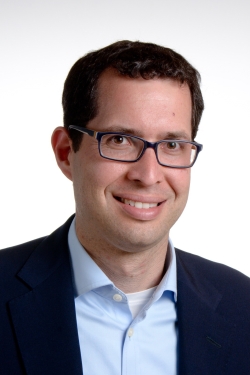
Yehonatan Givati (Spring)
Global Research Fellow
Israel
yg35@nyu.edu
Yehonatan Givati is the Sylvan M. Cohen professor at Hebrew University Law School, and the founding director of the Aumann-Fischer Center for Law, Economics, and Public Policy at Hebrew University, and a member of Hebrew University's Center for the Study of Rationality. His scholarly interest lies in the area of economic analysis of law. His work is both theoretical and empirical, and he applies the tools of law and economics to three main areas of law: tax law, law enforcement, and administrative law and regulation. He has also published in the areas of private law and judicial behavior. Professor Givati received a PhD from the Economics Department at Harvard University in 2013, and an SJD from Harvard Law School in 2011.
While at NYU, Professor Givati will work on several projects, on the economic consequences of uncertain property rights. on mass tort advertising and multidistrict litigation, and on optimal thresholds in substantial-presence taxation.
Center Affiliation: Center for Law, Economics, and Organization
Research Project: Mass Tort Advertising and Multidistrict Litigation
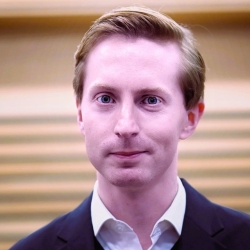
Robert Greally
Global Research Fellow
United Kingdom
rg5374@nyu.edu
Dr. Robert Greally is a Lecturer in Law at the Bristol University Law School in the United Kingdom. He previously completed his PhD in Constitutional Theory at the University of Sheffield in 2020 and was awarded a Modern Law Review COVID-19 Fellowship in the same year.
Robert’s research focuses on the relationship between law and ordinary democratic politics within modern constitutional democracies, with a particular focus on how political institutions, such as legislative assemblies and political parties understand, shape, and interact with constitutions. He has published in these areas in leading academic publications and blogs, including the Oxford Journal of Legal Studies, Public Law, the Cambridge Law Journal and the UK Constitutional Law Association Blog. He co-founded and co-directed the Centre for European and Public Law at Bristol University and currently co-convenes the UK Constitution Law Association's Doctoral and Early Career Researcher support activities.
Robert has been awarded the US-UK Fulbright Commission Scholar Award to conduct research at NYU. His research project examines the reasons behind the distrust and neglect of legislatures in modern constitutional theory through a comparative historical analysis of U.S. and U.K. constitutional thought. This will form part of the forthcoming monograph on the importance of democratic legislative assemblies for constitutional democracy.
Center Affiliation: Center for Law and Philosophy
Research Project: The Least Examined Branch: A Critical Analysis of How Legislatures Became Distrusted and Neglected within US and UK Constitutional Thought
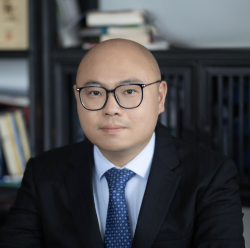
Jiajun Luo
Postdoctoral Global Fellow
Hong Kong
jl18161@nyu.edu
Luo Jiajun is a Hauser Postdoctoral Global Fellow and an affiliated scholar of the U.S.-Asia Law Institute. Trained in comparative constitutional and public law, his research focuses on legality, dispute resolution, public law, and judicial institutions in authoritarian regimes and global south contexts. He studies how these practices complement/challenge liberal, court-centric, and modernization assumptions in comparative law.
At NYU, he is developing the project Authoritarian ADR: China’s Fengqiao Model of Dispute Resolution, which explains how non-litigious mechanisms are used to resolve disputes, enforce social policies, secure political compliance, and consolidate state authority. This research invites discussion on how “justice” and “legality” should be understood in authoritarian regimes. It raises questions about whether pragmatic problem-solving under anti-litigious conditions constitutes law—and if not, how such practices should be conceptualized. By challenging the presumed boundaries between legal and political realms in authoritarian contexts, and by drawing on Global South and decolonial epistemologies, the project seeks to advance a more critical and theoretically grounded approach to the study of law, justice, development and governance beyond liberal democratic frameworks.
Luo’s scholarship has appeared in the Hague Journal on Rule of Law, the Asian-Pacific Law & Policy Journal, and the Research Handbook on Law and Democracy (Edward Elgar Publishing), and he has also written for USALI Perspectives, ChinaFile, and the European Chinese Law Research Hub, among other academic and policy forums. His work has been cited by the U.S. Congressional-Executive Commission on China, the Office of the United Nations High Commissioner for Human Rights, and other domestic and international bodies.
Previously, Luo was the China Law Fellow at the Georgetown University Center for Asian Law and a research scholar at the Philip K.H. Wong Centre for Chinese Law. He has also held visiting positions at Cornell Law School and worked as a Chinese Law Course Consultant at the University of Virginia School of Law, and he has taught both undergraduate and graduate courses at the University of Hong Kong. He earned his PhD in Law from the University of Hong Kong, where his dissertation Chinese Courts: Unequal Justice received a Dissertation Year Fellowship and was nominated for the Li Ka Shing Prize and the HKU Foundation Award for Outstanding Research Postgraduate Students. He also holds an LLM from the University of British Columbia and an LLB (summa cum laude) from the Shenzhen University. A citizen of Hong Kong, Luo was born and raised in Shenzhen and is a native bilingual speaker of Mandarin and Cantonese.
Center Affiliation: U.S.-Asia Law Institute
Research Project: Authoritarian ADR: China’s Fengqiao Model of Dispute Resolution
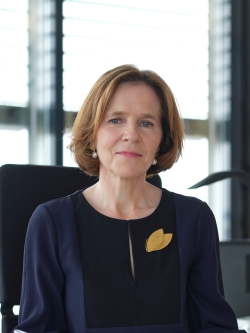
Síofra O’Leary
Hauser/Remarque Global Fellow
Ireland
so2769@nyu.edu
Síofra O'Leary has joined NYU as a Hauser/Remarque Global Fellow. She is a former Judge and President of the European Court of Human Rights (2015 – 2024). Prior to joining the European Court of Human Rights (ECtHR), she worked for almost two decades at the Court of Justice of the European Union (CJEU) in both judicial and administrative capacities (1996 – 2015). She is also an Adjunct Full Professor at University College Dublin and a Visiting Professor at the College of Europe (Bruges). Since stepping down as President of the ECtHR, she has received several honours, in recognition of her legal work and European service.
A graduate of University College Dublin (BCL 1989), her doctoral research at the European University Institute focussed on the emerging legal status of European Union citizenship (EUI 1993). She then published two books on The Evolving Concept of Community Citizenship (Kluwer, 1996) and Employment Law at the European Court of Justice (Hart Publishing, 2001). Parallel to her work at the two European courts, she has published numerous articles and chapters in academic journals and legal monographs on the protection of fundamental rights in EU law and under the ECHR, EU employment law, the free movement of persons and services and EU citizenship.
During her stay at NYU, Dr. O’Leary plans to conduct research on the consequences of the operationalisation by the CJEU of Article 2 of the Treaty of European Union, which provides that the EU is founded on values such as human dignity, freedom, democracy, equality, the rule of law and respect for human rights. Having played a key role in recent years in ground-breaking case-law responding to rule of law backsliding in certain EU Member States, this “values” provision is now featuring more broadly in the reasoning of the CJEU. The research will reflect on the consequences of CJEU values oversight for the work of national constitutional courts in EU Member States and the ECtHR.
In addition, returning to her early research on EU citizenship, Dr. O’Leary will examine whether the fact that certain EU citizens lose their voting rights in national parliamentary elections as a result of the exercise of their free movement rights can be regarded as compatible with the TEU. The latter enshrines the principle of democracy and provides for a legislative process involving representation of EU citizens via both the European Parliament and the Council of the EU. The nature of this process, the ever-expanding scope of the EU’s legislative competences and the aforementioned EU values, which the CJEU is deploying in other cases, raise questions about whether the continued disenfranchisement of certain EU citizens is feasible.
Center Affiliation: The Remarque Institute
Research Project: Reflections on the operationalisation of Article 2 TEU
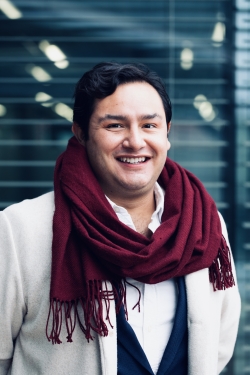
Daniel R. Quiroga-Villamarín
Hauser/Remarque Global Fellow
Colombia
d.quiroga.villamarin@nyu.edu
Daniel R. Quiroga-Villamarín is a postdoctoral researcher and is currently pursuing his lecturing qualification (habilitation, in German) at the Institute for Legal and Constitutional History of University of Vienna. He holds a BA in Law with a minor in Public Affairs (2018) from the Universidad de los Andes —Uniandes (Bogotá, Colombia) and a MA in International Law (2020) from the Institut de Hautes Études Internationales et du Développement —IHEID (Geneva, Switzerland), where he was awarded the Fondation Hans Wilsdorf scholarship and the Mariano Garcia Rubio Prize for best MA dissertation. He obtained his PhD in International Law with a minor in International History & Politics (2024) —with the distinction summa cum laude avec les félicitations du jury— at this same institution. He was awarded a three-year Swiss National Science Foundation (SNSF) Doc.CH grant for this purpose.
In tandem with his graduate studies in Geneva, he has also been a research assistant at the United Nations International Law Commission (summer 2019); an exchange student at Melbourne Law School (fall 2019); a visiting researcher at Harvard Law School (fall/winter 2019-2020); an adjunct lecturer of European History at Sciences Po Nancy (fall 2020); a Junior Schindler Scholar at the University of Zurich (2021-2022); a Wilson Center Cold War Archives Institute Research Fellow (2021-2022); a visiting researcher at the Vrije Universiteit Brussel (spring 2022); an exchange scholar at Yale University’s History Department (fall 2022); an adjunct lecturer at the Universidad de los Andes School of Law (spring 2023); a Junior Visiting Fellow at the Institut für die Wissenschaften vom Menschen in Vienna (September 2023); a guest researcher at the Berlin Potsdam Kolleg-Forschungsgruppe “The International Rule of Law - Rise or Decline?” (fall 2023); a Writing-up Fellow at the Max Planck Institute for Social Anthropology in Halle (spring 2024); a visiting researcher at the Max Planck Institute for Comparative Public Law and International Law in Heidelberg (fall 2024), a Scholar in Residence at the University of Amsterdam (winter 2025), and a Ernst Mach Fellow at the University of Vienna (spring 2025).
During the 2025-2026 academic year, he will be based at New York University as a Hauser/Remarque Global Fellow. He will work on the finalisation and publication of his first monograph, "Architects of the Better World." Departing from his doctoral research, this project offers the first book-length analysis of the architecture of international cooperation in international legal history. It studies the intersections between the built-environment, democratic ideals, and the institutionalization of international law in the twentieth century —from Geneva to New York City; from Bogotá to Addis Ababa; and from Vienna to Rome (1899-1998).
Center Affiliation: The Remarque Institute
Research Project: Architects of the Better World: Democracy, Law, and the Construction of International Order, 1899-1998

Filippo Venturi (Fall)
Postdoctoral Global Fellow
Italy
fv2127@nyu.edu
Filippo Venturi is a Postdoctoral Global Fellow affiliated with the Peter L. Zimroth Center on the Administration of Criminal Law. His current research project critically examines how traditional theories of criminalization fail to adequately address the problem of overcriminalization – particularly regarding regulatory crimes and other mala prohibita offenses – with the ultimate goal of developing a coherent decriminalization strategy that responds to these shortcomings. Filippo is also a Postdoctoral Researcher at the Sant’Anna School of Advanced Studies, contributing to a research on the role of casuistry in the development of modern criminal law. In addition to his academic work, he is a licensed attorney in Italy.
Filippo earned his JD (summa cum laude) from the University of Pisa and his PhD (summa cum laude) from the Sant’Anna School of Advanced Studies. For the 2024–2025 academic year, he was appointed Fulbright Visiting Scholar at Columbia Law School, where he served as an Article Editor for the Columbia Journal of European Law and as Vice-President of the Columbia Law School Italian Society. He has also held visiting research positions at several prestigious institutions, including the École Normale Supérieure in Paris, the Institute of Advanced Legal Studies in London, the University of Toronto, and the Max Planck Institute for the Study of Crime, Security and Law in Freiburg.
In recent years, he has published on theories of criminalization, economic and environmental criminal law, crimmigration, hate crimes, and European criminal law. More broadly, his main research interests include comparative criminal law, the history and philosophy of substantive criminal law, legal theory, and critical legal studies.
Center Affiliation: Peter L. Zimroth Center on the Administration of Criminal Law
Research Project: Regulatory Crimes and the Authoritarian Foundations of Modern Criminal Law: Towards a Theory of Decriminalization

Sebastian von Massow
Postdoctoral Global Fellow
Germany, United Kingdom
sv3252@nyu.edu
As of September 2025, Sebastian is a Postdoctoral Global Fellow affiliated with the Institute for International Law & Justice. He is funded through the University of Copenhagen.
Sebastian is interested in the strategic use of law by state and non-state actors, the interaction of legal regimes, and the relationship between colonialism and international law. This year, he is working on Euro-African treatymaking practices in the transition between colonialism and European integration. He is also transforming his PhD thesis into a book proposal and developing a research agenda on how states make and break law through projects of annexation.
Before joining NYU, Sebastian completed his PhD, Litigating Colonial Self-Determination, at the European University Institute under the supervision of Sarah Nouwen. Building on extensive fieldwork, analysis of court submissions, and over one hundred interviews, his thesis argues that international law can be a powerful if not limitless instrument in anticolonial campaigns when understood from the perspectives of the Third World actors using it and the lawyers they instruct.
Center Affiliation: Institute for International Law and Justice
Research Project: The Colonial Twilight Zone: Euro-African Treatymaking between Colonialism and European Integration
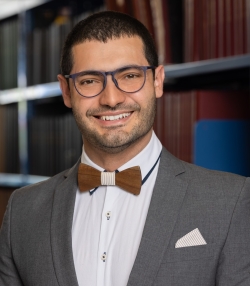
Gustavo Weiss de Resende (Spring)
Postdoctoral Global Fellow
Brazil
gw2555@nyu.edu
Gustavo Weiss de Resende is a Postdoctoral Hauser Global Fellow, previously working as the Wolfgang Gassner Senior Teaching and Research Fellow at the Institute for Austrian and International Tax Law at the Vienna University of Economics and Business, in Austria. He was also a visiting scholar doing research at the Centre for Business Taxation at the University of Oxford, in England. He obtained his PhD in law from the Max-Planck Institute for Tax Law and Public Finances and the University of Munich, in Germany, validated in Brazil by the Federal University of Minas Gerais, with the award-winning thesis “An Answer to Aggressive Tax Planning with Intangibles”, where he provided a normative answer to cross-border intra-group royalty payments as an integral component of aggressive tax planning structures.
Furthermore, he obtained an LLM in International and European Economic Law - with an emphasis on international taxation – from the Ludwig-Maximilians University in Munich, in Germany, as well as his JD from the Federal University of Juiz de Fora, in Brazil. He also has extensive academic and practical experience working with tax law and public finance in international organizations such as the Global Forum of the Organization for Economic Cooperation and Development (OECD), in Paris, and for the European Commission's Legal Service for budget/customs/taxation, in Brussels.
During his fellowship at NYU, he will develop his research project entitled “U.S. International Tax Policy and the Fragmentation of Global Fiscal Governance: Competing Visions Under the OECD and UN Frameworks”, where he explores how the US role in a fragmented fiscal landscape shapes the future of global tax cooperation, the balance of power in tax policy negotiations, and the prospects for achieving a cohesive global tax framework.
Center Affiliation: Graduate Tax Program
Research Project: U.S. International Tax Policy and the Fragmentation of Global Fiscal Governance: Competing Visions Under the OECD and UN Frameworks

